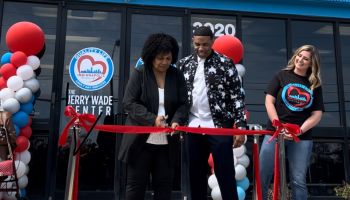Date: Wednesday, February 24, 2010, 5:39 am
By: Denise Stewart, BlackAmericaWeb.com
An impassioned debate ignited Tuesday morning over America’s black agenda, with two of the nation’s most visible black political commentators on opposite sides of the table.
In a commentary on “The Tom Joyner Morning Show,” Tavis Smiley, host of “Tavis Smiley” on PBS, announced plans for a discussion in Chicago on March 20 entitled “We Count: The Black Agenda is the American Agenda.” As part of his comments, he opined that “a chorus of black leaders have started singing a new song,” saying that the president doesn’t need a black agenda.
“I must have missed that choir rehearsal, because I don’t know the words to this new hymn,” Smiley said. “We have asked some of these lyricists to show up who apparently wrote this new song to explain why they penned these words. It’s time for a choir rehearsal so that we all are singing from the same page.”
The media host listed some of the most noted political and academic leaders as invited guests, including the Rev. Al Sharpton, Harvard law professor Charles Ogletree, author and scholar Michael Eric Dyson, professor Cornel West, California Rep. Barbara Lee and Dorothy Height of the National Council Negro Women.
“Do we think we can give President Obama a pass on black issues and somehow, when he is no longer in office, resurrect the moral authority to hold future presidents accountable to our concerns?” Smiley asked.
Smiley’s concerns were based on comments published recently in national media and a recent meeting between President Barack Obama, Sharpton, NAACP President Ben Jealous and National Urban League President Marc Morial to discuss the jobs bill currently being considered in Congress.
Sharpton later called in to the TJMS and took issue with several of Smiley’s comments, claiming that Smiley had not talked with him about the event. Then in the afternoon, Smiley called in to Sharpton’s radio talk show as he discussed the matter with Ogletree. Their exchange on Sharpton’s show lasted several minutes and was highlighted by abrupt cutoffs and a more intense debate.
According to Sharpton, while he, Morial and Jealous talked with the president earlier this month about getting the jobs bill passed, the focus was on getting aid to the communities with the greatest need, and many of those communities have a majority black population with double-digit unemployment.
“We did not ask for a race bill because we did not think it would pass,” Sharpton said on the TJMS. “We asked for a grace bill, where the jobs would go to where people are impacted.”
The veteran activist said that despite Smiley’s stance, he would not hold Obama to a standard different from that of other presidents.
“When they were running around buck-dancing for Bill Clinton, they did not ask for a black agenda – I did,” Sharpton said. “And I continue to do that. As far as I know others are doing that.”
Ogletree, a close personal friend of Obama, who taught both the president and his wife, Michelle, at Harvard Law School, also called in the the TJMS and said he often talks to the president about the needs of the black community.
“He has definitely been accountable, and he needs to be accountable,” Ogletree said referring to the president.
“No, I’m not giving the president a pass,” he said. “The reality is that the president has to do certain things, but there are certain things he can’t do. He can’t create a black jobs program, but he can create a program that benefits African-Americans by helping others as well.”
Ogletree said he will be out of the country for the month of March and would be unable to attend the conference with Smiley. Sharpton said that if invited – he denied having been invited to take part – and his schedule is clear, he may attend. Sharpton was a regular participant in Smiley’s 10-year run with the “State of the Black Union” gatherings. Sniley canceled that gathering this year.
When Smiley called in on Sharpton’s show and greeted him by asking how he was doing, Sharpton had a quick response: “I was doing fine until you started messing with me this morning. What’s wrong with you?”
James Taylor, a political science professor at the University of San Francisco, calls the current debate an example of black political elite fighting for better positions for themselves.
“This really isn’t about representing the concerns of everyday black people,” Taylor told BlackAmericaweb.com. “You have black millionaires coordinating a program that is economically driven and not protest driven.”
While blacks, like others in America, want to see more people back to work, most don’t look to activists for the real solutions, Taylor said.
“They look past Smiley and Sharpton. They look to President Obama for policy that will eradicate the poverty of blacks,” Taylor said.
Syracuse University professor Boyce Watkins said the debate between Sharpton and Smiley is one that can probably be heard at dinner tables across America.
“If you ask black people if you approve of President Obama, 95 percent or so will probably say yes. But if you ask is he doing a good job of bringing jobs for blacks in this country, they will say, maybe or kind of,” Watkins said.
While he agrees a conversation on the black agenda in America is needed, Watkins questions whether a forum through Smiley would be the best setting for such a discussion.
“There’s nothing wrong with criticizing the actions or inaction of the president. I don’t agree with how he has handled some things – but this could be the anti-Obama Tea Party for black people,” Watkins said, adding that Smiley does not have “access” to the Obama White House.















